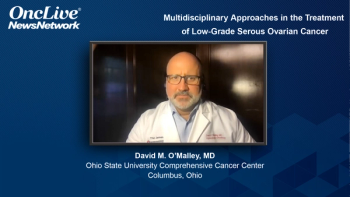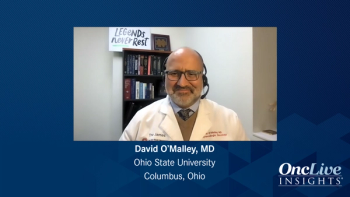
David M. O’Malley, MD, and Chandler H. Park, MD, FACP, discuss updates in gynecologic oncology at the 2024 ASCO Annual Meeting.

Your AI-Trained Oncology Knowledge Connection!


David M. O’Malley, MD, and Chandler H. Park, MD, FACP, discuss updates in gynecologic oncology at the 2024 ASCO Annual Meeting.

OncLive® will be LIVE with OncLive® News Network: On Location at the 2024 ASCO Annual Meeting. Each day, we will broadcast a series of interviews with top thought leaders, to learn their thoughts and reactions to data presented across oncology during the conference.

The panel closes their discussion by highlighting challenges in the treatment of cervical cancer, emphasizing the need for more focus on clinical trials and therapies, as well as addressing disparities in cancer care, particularly for patients of color.

Bradley Monk, MD, shares the promising potential of anti-HER2 therapy in cervical cancer and discusses encouraging results from recent trials, emphasizing the importance of testing for HER2 and considering anti-HER2 antibody drug conjugates as a treatment option.

Experts in gynecologic oncology discuss the positive results of TV-301, a confirmatory trial for TV-204, raising the possibility of moving tisotumab vedotin earlier in the treatment of patients with cervical cancer, and the potential to combine it with pembrolizumab.

Experts detail the management of ocular toxicity associated with tisotumab vedotin in patients with cervical cancer, emphasizing the need for eye care professionals and a team approach, along with addressing peripheral neuropathy.

Dana M. Chase, MD, FACOG, discusses the antibody-drug conjugate tisotumab vedotin including its mechanism of action, its accelerated approval for patients with recurrent cervical cancer and at least one prior line of therapy, and the management of toxicities such as neuropathy and pneumonitis.

Leslie M. Randall, MD, reviews updates to the NCCN guidelines for cervical cancer, including the use of pembrolizumab in the second and third-line settings, the results of the KEYNOTE-826 trial, and the potential role of induction chemotherapy with weekly carboplatin and paclitaxel in the treatment of locally advanced cervical cancer.

David M. O’Malley, MD, discusses cervical cancer epidemiology, risk factors, and diagnosis, highlighting the importance of HPV vaccinations, regular PAP smears, and the use of various biomarkers for treatment decision making.

Experts are enthusiastic about the potential of antibody drug conjugates to de-escalate therapy and reduce toxicity in advanced and recurrent endometrial cancer treatment, with a focus on the importance of diversity plans in clinical trials to ensure broader applicability.

The panel highlights recent data on antibody drug conjugates targeting TROP2 in patients with advanced or recurrent endometrial cancer and the need for dose optimization.

Key opinion leaders share excitement about antibody-drug conjugates targeting HER2 in advanced or recurrent endometrial cancer, and debate optimal HER2 testing methods, with some preferring gastric cancer scoring criteria over breast cancer criteria.

The panel reviews results from the ATTEND and DUO-E trials in advanced endometrial cancer, suggesting pembrolizumab remains the standard for the dMMR patient subset while combinations with PARP inhibitors may improve outcomes in pMMR.

Dr Thomas C. Krivak highlights key data from the GY018 trial investigating chemotherapy plus pembrolizumab in both dMMR and pMMR advanced endometrial cancer, confirming and extending the findings from the RUBY trial supporting pembrolizumab's approval and use in both dMMR and pMMR populations.

Thomas C. Krivak, MD, shares the positive results from the RUBY trial of pembrolizumab plus chemotherapy followed by maintenance in patients with dMMR advanced endometrial cancer, supporting its approval and use in this population.

David M. O’Malley, MD, details the definition of dMMR (mismatch repair deficiency), its prevalence in advanced endometrial cancer, and current treatment approaches for dMMR patients, with a focus on the potential for cure in recurrent/metastatic dMMR patients based on clinical trial data.

The panel discusses factors to consider when determining best treatment options for patients with recurrent or advanced endometrial cancer, including traditional clinical trial endpoints, cost, chance for cure versus disease control, and most importantly, patient preference.

Dr O’Malley discusses strategies in collaborating with multidisciplinary teams for quality of life, fertility preservation, and management of treatment related side effects to optimize patient wellbeing.

Key opinion leaders review recent updates to the NCCN guidelines for treating recurrent and advanced endometrial cancer, including biomarker testing and targeted therapies like dostarlimab and trastuzumab.

Expert gynecologic oncologists discuss recent progress in treating advanced endometrial and cervical cancers, including epidemiology, risk factors, evaluation, staging, and molecular testing.

Dr David O’Malley explains when to add and remove trastuzumab during endometrial carcinoma therapy.

A review of data from several clinical trials on the use of I/O + chemotherapy as treatment for endometrial carcinoma.

An overview of biomarker testing in endometrial carcinoma.

David M. O'Malley, MD, discusses the rationale to evaluate the combination of balstilimab and zalifrelimab in cervical cancer.

David M. O'Malley, MD, discusses future research directions with balstilimab and zalifrelimab in patients with cervical cancer.

David M. O'Malley, MD, discusses the promise of antibody-drug conjugates in ovarian cancer.

David M. O'Malley, MD, discusses the results of the phase 3 KEYNOTE-775 trial in advanced endometrial cancer.

David O'Malley, MD, discusses the adverse effects associated with mirvetuximab soravtansine in ovarian cancer.

David O'Malley, MD, discusses the activity of the investigational antibody-drug conjugate mirvetuximab soravtansine in ovarian cancer.

David O'Malley, MD, discusses the utility of mirvetuximab soravtansine in ovarian cancer.

Published: December 13th 2023 | Updated:

Published: December 6th 2023 | Updated:

Published: December 13th 2023 | Updated:

Published: November 29th 2023 | Updated:

Published: November 29th 2023 | Updated:

Published: April 15th 2021 | Updated: